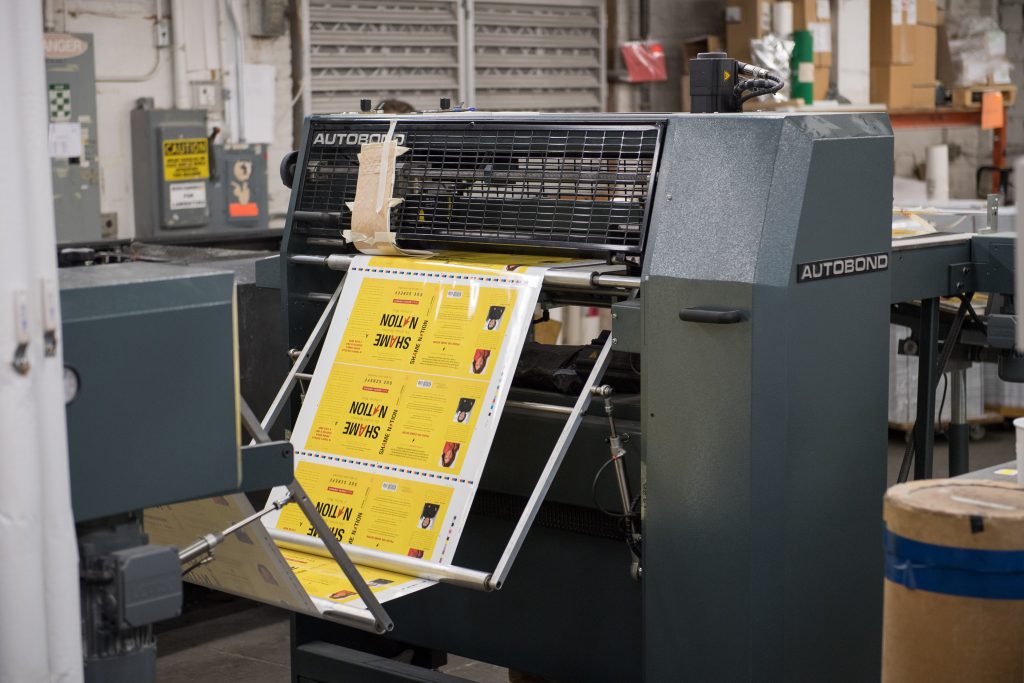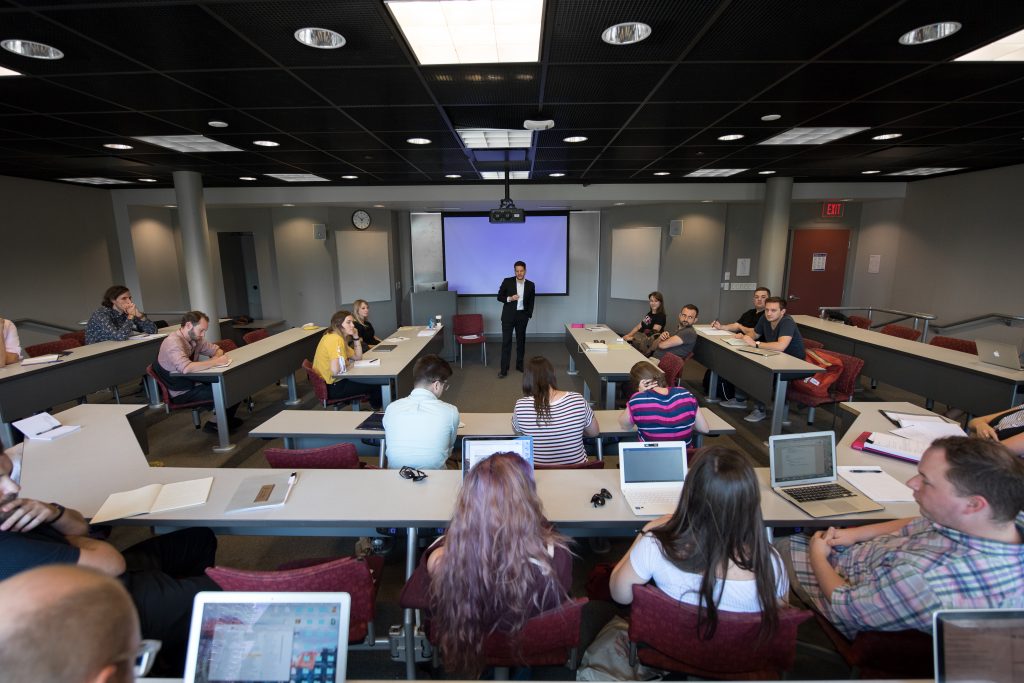Grad school is a major investment in your future career and it’s much more specialized than your focus of study in undergrad, so it’s always a good idea to make sure your grad school plans align with your end-game career goals. Luckily, there are plenty of options when it comes to careers in writing and publishing.
Here are just a few of the major career paths for graduates of a writing and publishing grad program:
Writer/Author

Of course, most students seeking a degree in writing want to become a writer! Though it may sound like a lofty goal to have your new work published or made into a movie or TV show, (and don’t get me wrong, it is!) the job prospects for a writer/author are about as good as any other industry. According to the Bureau of Labor Statistics (BLS) writing careers are projected to grow about 4% through 2032. That said, this includes writers for a variety of media types (who only ever writes in one genre, anyway?) and it’s common for most writers to be self-employed as freelancers so they can work on a variety of projects to support themselves. In 2020, for instance, the BLS reports that 68% of writers were self-employed.
Self-employment, freelancing, or even writing your own book or script (in any genre) aren’t your only options, though. Working for a magazine or newspaper, typically as part of a larger “media group” that bundles online and print publications within one brand or subscription, can offer a lot of opportunity for growth and creative variety as a writer. Even in the book world, “ghost-writing,” or writing under another person’s name, is becoming a popular way for writers to make money on the side while they work on their own projects or bylines. Almost any industry has a need for some type of writer – whether it’s technical or creative, brand-oriented or personal, private or public sector – so keep your eyes open for any position that strikes you as one with potentially interesting subject matter.
Publishing: Design & Digital Production
Many graduates with a Master’s in Writing and Publishing are more than qualified to work in the production side of the book or magazine industry, helping publishing houses or major media brands design and create layouts for print and online publications. These jobs often vary in their range of requirements that depend largely on whether they publish magazines, periodicals, books, online or in print, and even the size of the publishing or media company. Some will rely on production editors to write their own copy or design their own layouts, while others may have large separate departments for each element of their production cycle.

Regardless of the company’s size, most publishing houses, magazines, or other media groups and publications tend to put stock in industry experience over a degree — but that’s not to say an MA isn’t a great way to get both! Make sure you focus your courses appropriately – taking classes in book publishing won’t help much if your dream is to become an editor at Vogue – and leverage your extracurricular time in graduate school to gain experience in the field you’re interested in working in, especially if you’d like to work with a specific publisher or publication.
Though it’s long been argued that “print is dying,” I wouldn’t be concerned too much with the BLS’ declining job outlook here. As long as people continue to consume media at a breakneck speed and print brands continue to diversify the way they engage with (and advertise to) readers, there will still be plenty of demand for editors and designers in publishing. If you are looking for a publishing industry job with some more security, working as a publishing agent, or for a publication’s sponsored content division is often a great way to blend an eye for writing, design, and editorial skills with advertising and marketing.
Publishing: Editing & Copyediting
Within the writing and publishing world, editors hold one of the most essential jobs to getting books and periodicals in front of readers. Editing – reviewing a text to make comprehensive changes that will clarify or enhance its argument or central ideas – and copyediting – reviewing a text to make changes at the individual word- or sentence-level that will clarify meaning or correct errors – are two distinct positions that help writers move their work forward on the path to publishing. The courses required for an MA or MFA can prepare you equally well for this kind of work, though it’s important to focus your training in the genre (or genres) that you’d like to work with. Again, you’ll want to get some hands-on experience in editing too, as many employers will ask for a sample of written work you’ve either authored or edited independently.
Though job growth for editors is estimated to decline about 4% by 2032, even digital-only publications need editors. As social media and independent content creators continue to rise in popularity, it’s likely that demand for digital writing careers will continue to grow as well.
Journalist

Though a journalist could technically be classified as a type of writer, the skillset required of journalists is specifically tailored to writing for news. Whether it’s light celebrity gossip or breaking current events, journalists are tasked with gathering and fact-checking information from their sources to create a cohesive package for a variety of media outlets. As you might guess, a Master’s in journalism specifically, or even an undergraduate degree from journalism school will prepare you well for this type of career, but many writers find their way to journalism through experience with other types of writing, too.
Professor/Teacher
Aside from writing itself, one of the most popular career paths for graduates of Writing and Publishing grad programs is teaching others how to write. According to the BLS, employment of postsecondary teachers is projected to grow 8 percent by 2032, faster than the average for other occupations.
Whether you’re interested in working as a professor in postsecondary education, a teacher of high school, middle grade, or younger students, or even as an instructor with a local community writing center, a doctoral or terminal degree is typically required by most institutions. A Master’s may suffice for most secondary educational institutions, certain community colleges or writing centers, and will certainly prepare you well for a PhD, but an MFA in Writing typically provides plenty of opportunities for training in teaching.
For those interested in teaching Creative Writing specifically, the MFA is considered a terminal degree (though PhD programs have begun gaining popularity), and graduates are often able to pursue jobs in teaching with experience they’ve gained just by completing their program. At Emerson, all Publishing & Writing MA students and Creative Writing MFA candidates are eligible to apply for a position as a Graduate Student Instructor within the Writing Studies Program after completing WR600, Teaching College Composition, a semester course designed to prepare students for careers teaching writing, rhetoric and composition.

As you can see from the variety of options here – in both careers and degrees – any grad program in writing and publishing has a wide range of possibilities! Once you’ve narrowed down your future career aspirations, you’re ready to find a grad program that best fits your needs.
For those interested in any of these careers in the writing or publishing industry, Emerson has several different graduate programs that offer either a Masters (MA) or Master of Fine Arts (MFA) degree, each with a slightly different focus. Although, you’ll find a lot of overlap in potential career paths for both MA and MFA students. If you’re looking for a Master’s in the writing field, check out our Publishing & Writing or Journalism and Media Innovation programs, or the Creative Writing, Popular Fiction Writing & Publishing, and Writing for Film & Television programs if you’re interested in getting your MFA.
For a look at what GradLife is really like in the many programs here at Emerson, check out some of our other blog posts, or give us a follow on social media: @emersongradprograms!


student
As a current writing and publishing graduate student, appreciate the guidance and inspiration provided in this post. It really provides valuable insight into potential career paths, and showcases the diverse range of opportunities available in the field.
Sara Robins
Great insights! It’s encouraging to see so many career paths available for writing grads beyond traditional publishing. Content creation, UX writing, and technical writing are especially in demand.